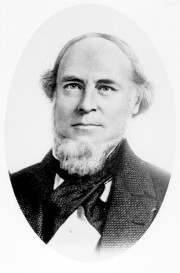(1806-1876) a U.S. Representative, was born in Brentwood, New Hampshire on November 23, 1806. He attended Phillips Exeter Academy in Exeter, New Hampshire. He studied law, was admitted to the bar and began his practice in Portland in 1826. Smith was division advocate of the fifth division of the circuit court-martial in Maine 1829-1834.
Smith served in the Maine House of Representatives in 1831 was a member of the Maine State Senate in 1833 and served as its president.
Elected as a Jacksonian to the Twenty-third and Twenty-fourth Congresses and as a Democrat to the Twenty-fifth Congress (March 4, 1833-March 3, 1839), Smith was chairman of the Committee on Commerce (Twenty-fifth Congress), but was an unsuccessful candidate for reelection in 1838.
He supported Samuel F.B. Morse in perfecting and introducing the electric telegraph. According to Annteresa Lubrano,
On February 21, 1838, President Martin Van Buren and his Cabinet witnessed a demonstration of Samuel F. B. Morse’s electric telegraph. On February 21, 1838, Congressman Francis O. J. Smith submitted a report to the House of Representatives in which he writes: “It is obvious, however, that the influence of this invention over the political, commercial and social relations of the people of this widely extended country . . . will amount to a revolution unsurpassed in moral grandeur by any discovery that has been made in the arts and sciences . . .”
Five years later Congress appropriated $30,000 to support Morse with his experiments. The first telegraph line in the United States (between Washington, D.C. and Baltimore, Maryland), was completed on April 28, 1844.
Again a member of the Maine House of Representatives in 1863 and 1864, he died in Deering (later Woodfords; thereafter, Portland) on October 14, 1876, with interment on his estate, “Forest Home”; reinterment in Evergreen Cemetery in Portland.
Additional resources
Gaffney, Thomas L. “Maine’s Mr. Smith: A Study of the Career of Francis O. J. Smith, Politician and Entrepreneur.” Ph.D. dissertation, University of Maine, 1979.
Lubrano, Annteresa. The Telegraph: How Technology Innovation Caused Social Change. New York, NY. Routledge. 1997. p. 38. Exerpt from Google Books at http://books.google.com/books?
id=BN8bVfbJAj0C&pg=PA38&lpg=PA38&dq=%22Francis+O.+J.+Smith%22+morse+telegraph&source=bl&ots=dCvO5qeVIa&sig=rs4fmolGukfuX8eFAnb1gaaJiqI&hl=en&sa=X&ei=A4LcUrPvO4qwsQSn8ICIAw&ved=0CDUQ6AEwAQ#v=onepage&q=%22Francis%20O.%20J.%20Smith%22%20morse%20telegraph&f=false (accessed January 19, 2014)


